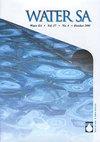Optimization of bromate adsorption onto Fe-CNTs nanocomposite using response surface methodology
IF 1.2
4区 环境科学与生态学
Q4 WATER RESOURCES
引用次数: 3
Abstract
This study was aimed at employing response surface methodology (RSM) for optimization of process variables and identifying optimal conditions for the adsorption of bromate (BrO3-) from contaminated water using multi-walled carbon nanotubes, based on iron hydr(oxide), Fe-CNTs nanocomposite. Fifteen experimental runs were conducted in batch mode to study the effect of individual as well as interactive process variables, i.e., pH, BrO3− initial concentration, and adsorbent dose, on the removal of BrO3− using Box–Behnken design (BBD) of RSM. The coefficient of determination (R2) at 98.34% indicated a good agreement between actual and predicted values. The main effect and contour plot were drawn to obtain the independent and interactive effect of operational variables on BrO3− uptake. A process optimization curve was drawn to determine the optimum operating conditions that lead to a desirable response. The optimum conditions for BrO3− adsorption using Fe-CNTs nanocomposite were found to be pH 2.0, initial BrO3− concentration of 10.0 mg/L, and adsorbent dose of 0.010 g per 50 mL solution.响应面法优化铁碳纳米复合材料对溴酸盐的吸附
本研究旨在利用响应面法(RSM)优化工艺变量,并确定基于铁(氧化物)、Fe-CNTs纳米复合材料的多壁碳纳米管从污染水中吸附溴酸盐(BrO3-)的最佳条件。采用Box-Behnken设计(BBD),以批处理方式进行了15次实验,研究了pH、BrO3−初始浓度和吸附剂剂量等单个和交互过程变量对RSM去除BrO3−的影响。决定系数(R2)为98.34%,表明实际预测值与预测值吻合较好。绘制了主效应图和等高线图,得到了各操作变量对BrO3−吸收的独立影响和交互影响。绘制了工艺优化曲线,以确定能产生理想反应的最佳操作条件。结果表明,Fe-CNTs纳米复合材料吸附BrO3−的最佳条件为pH 2.0,初始BrO3−浓度为10.0 mg/L,吸附剂剂量为0.010 g/ 50 mL。
本文章由计算机程序翻译,如有差异,请以英文原文为准。
求助全文
约1分钟内获得全文
求助全文
来源期刊

Water SA
环境科学-水资源
CiteScore
2.80
自引率
6.70%
发文量
46
审稿时长
18-36 weeks
期刊介绍:
WaterSA publishes refereed, original work in all branches of water science, technology and engineering. This includes water resources development; the hydrological cycle; surface hydrology; geohydrology and hydrometeorology; limnology; salinisation; treatment and management of municipal and industrial water and wastewater; treatment and disposal of sewage sludge; environmental pollution control; water quality and treatment; aquaculture in terms of its impact on the water resource; agricultural water science; etc.
Water SA is the WRC’s accredited scientific journal which contains original research articles and review articles on all aspects of water science, technology, engineering and policy. Water SA has been in publication since 1975 and includes articles from both local and international authors. The journal is issued quarterly (4 editions per year).
 求助内容:
求助内容: 应助结果提醒方式:
应助结果提醒方式:


